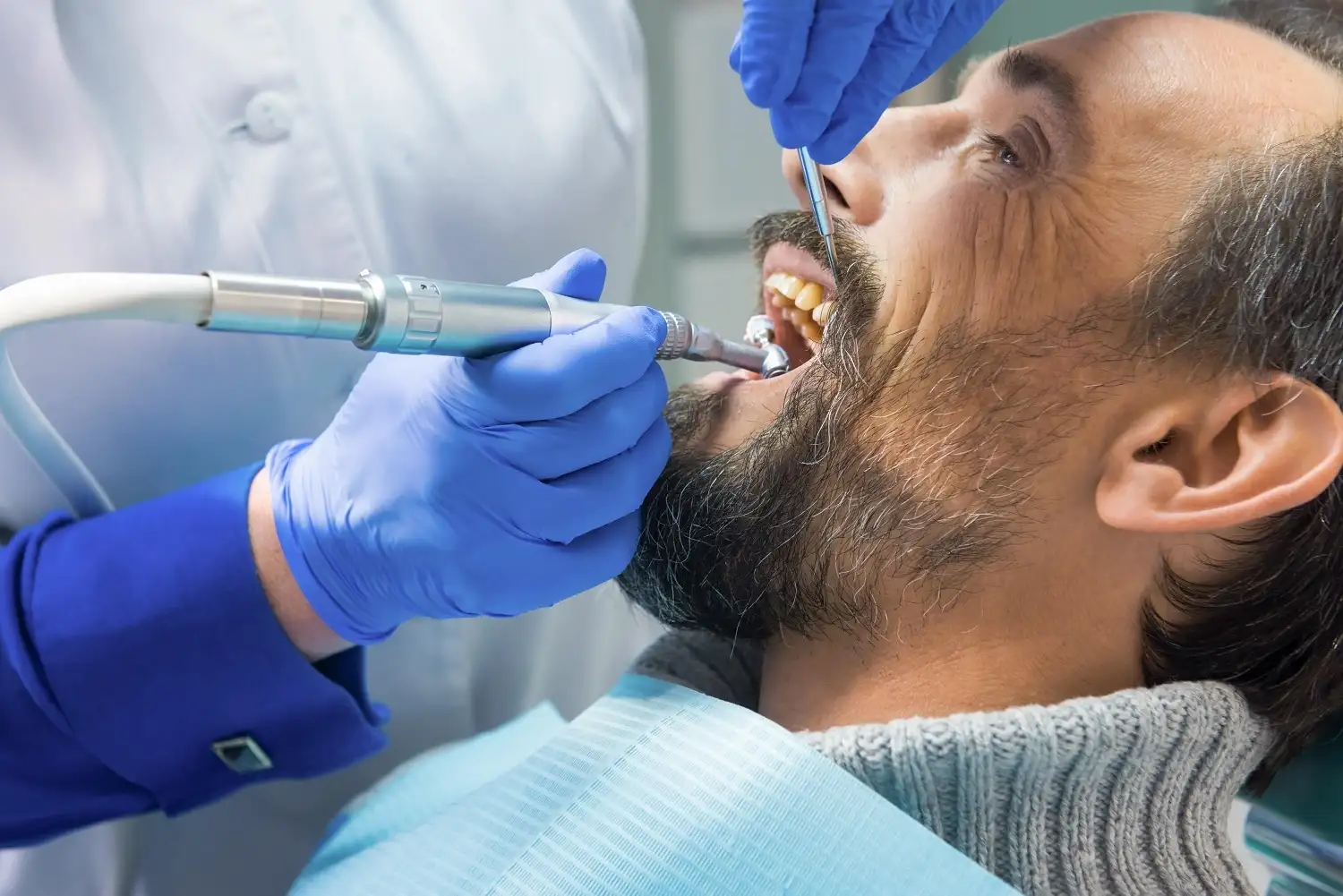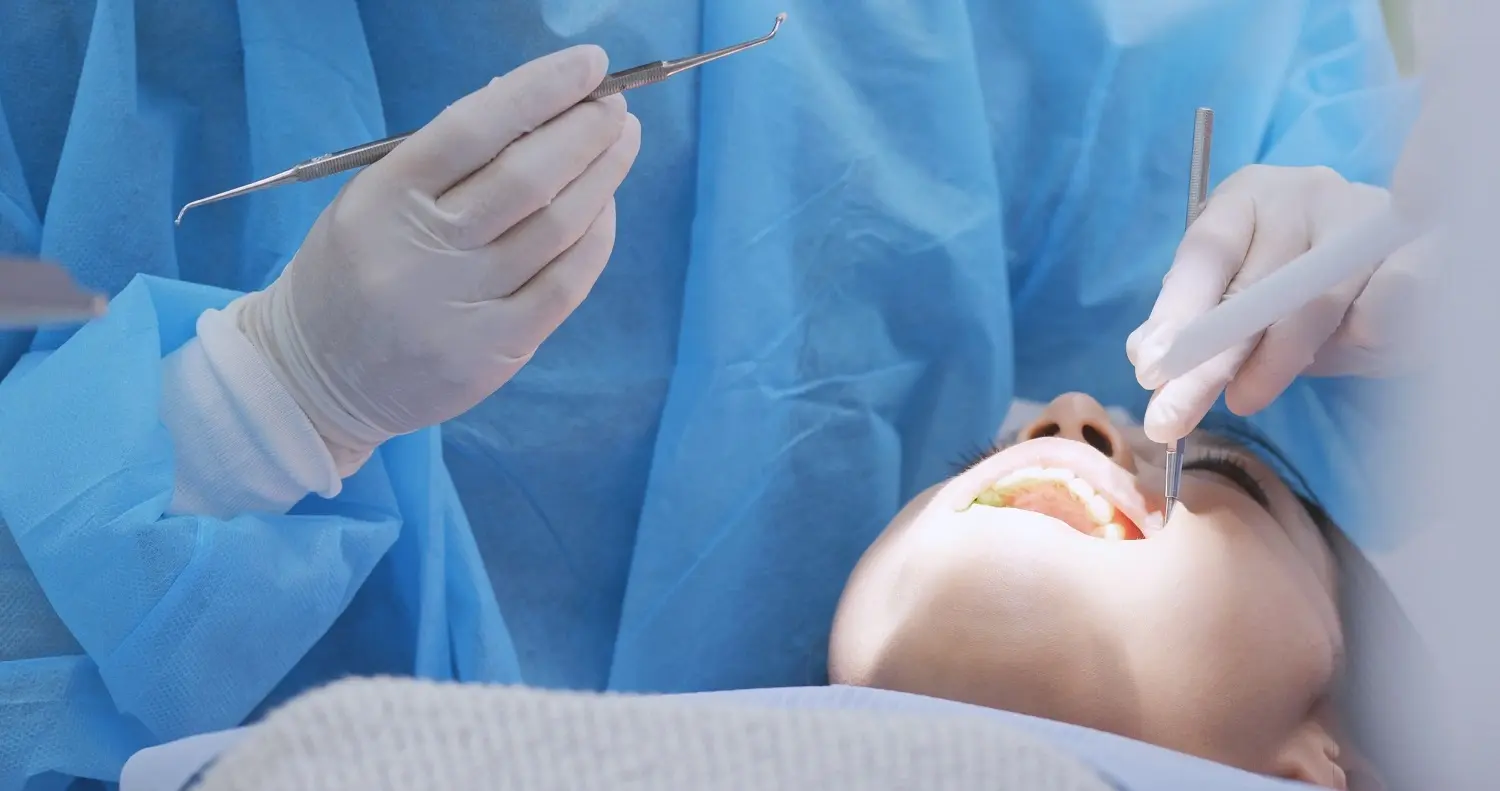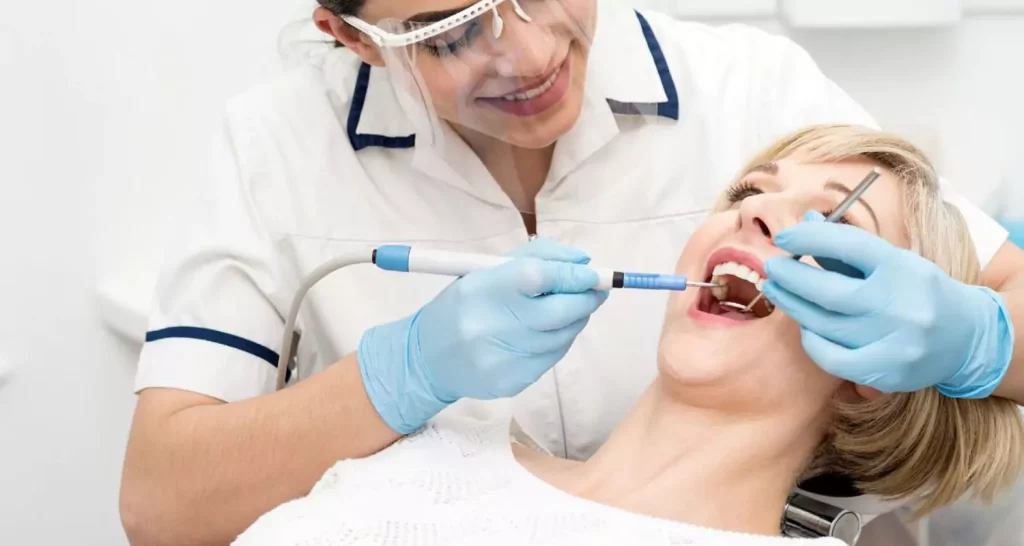Last Updated on: 4th December 2024, 05:18 pm
Dentists almost always recommend follow-up visits twice a year to perform the procedure of deep cleaning teeth and evaluate your oral health; however, for many people, this can be a time of stress due to the sound of the dental equipment.
Everyone requires dental cleaning teeth at least once a year to assess the state of their teeth and gums. Signs that you require a deep dental cleaning would be bleeding gums and receding and loose teeth.
What is dental deep cleaning? When should it be applied?
Deep Teeth Cleaning is a common name for a procedure called periodontal scaling and root planing. It may be similar to the standard cleaning you get from a dental hygienist. Both involve the removal of plaque and tartar from the teeth and gum line to treat or prevent periodontitis. However, deep cleaning teeth is a more comprehensive treatment most often used when bacteria have already started to cause a serious infection.

Deep cleaning teeth is a more complex procedure. It includes root planing and other treatments, such as the use of lasers to kill bacteria. Root planing as a type of gum therapy smoothes the tooth surface below the gum line. A rough surface provides pockets where bacteria can grow.
Infections start as gum disease, caused by a sticky film of bacteria called plaque (made up of saliva and food particles), which always forms on teeth. However, if the bacteria are not cleaned well, it can cause the gums to become inflamed, a condition known as gingivitis. If not treated in time, it can turn into periodontitis, a serious infection that occurs under the gums, causing them to separate from the tooth, leaving open spaces where bacteria in the tartar can enter. If left untreated, gum disease can lead to bone and tooth loss.
Periodontal disease affects approximately 47.2% of American adults. However, it is more frequent in men (56.4%) than women (38.4%).
Symptoms of gum disease include:
- Swelling
- Gums red or purple
- Bleeding
- gums
- Bad breath
- Pus between teeth
- Painful chewing
- (teeth appear longer than normal)
- New spaces between teeth
- Changes in the bite
- Loose or falling teeth
Periodontitis is usually caused by poor oral hygiene. You can prevent it by brushing your teeth regularly and using dental floss and mouthwash.
Taking into account the recommendations of the ADA (American Dental Association), it is necessary to visit a dentist at least twice a year, accompanied by a good oral hygiene routine.
How is the deep dental cleaning procedure performed?

Diagnosis: It is possible that before the treatment, the dentist in an assessment consultation will perform an X-ray to define which areas require intervention. Plaque and tartar accumulation will be located and situations such as periodontal conditions, caries, or dental mobility may be ruled out.
Deep cleaning teeth is a procedure that, although uncomfortable, should not be painful. The state of the patient’s oral hygiene must be taken into account before a diagnosis can be made. The dentist will determine if he can use a local anesthetic to numb the area; however, this will depend upon the patient’s clinical condition.
Tartar removal and surface polishing: Dentists use a scaling tool to reach under the gums and clean away bacteria. Following this, they smooth the roots of the teeth in a process called brushing to allow the gums to reattach. Some dentists use an ultrasonic scaling tool because it can be more comfortable than a regular scaling tool. They may put an antibiotic on the gums to help fight bacteria or may prescribe antibiotics or a special mouthwash.
It is possible that a week after the procedure or at the end of the treatment, you may still feel discomfort due to sore and swollen gums, and you may also experience sensitivity in the teeth. These symptoms may be normal sometime after treatment, so brushing 24 hours after the procedure and flossing are recommended. These recommendations, among others, will be told to you by the dentist and depending upon the condition, he or she will indicate how many times, diet, and type of toothbrush (generally, it is soft).
The advantages and disadvantages of performing a dental deep cleaning

Once considered the optimal treatment for periodontal disease, regular cleaning is no longer enough since scaling and root planing can reduce inflammation and give your teeth a chance to heal. However, as with any procedure, there are benefits and risks:
Advantages
- Eliminates tartar and bacteria and reduces inflammation
- It can reduce or prevent gum disease, allowing healthy tissue to grow back so the gums reattach to the teeth as long as good oral hygiene is continued.
- Improves bad breath
- Improving oral health reduces the risk of heart disease and other illnesses.
- It is low risk and non-surgical as a widely practiced procedure with few side effects.
- Improving the health of the gums prevents tooth loss.
Disadvantages
- It may cause discomfort, pain, and/or bleeding.
- It may not fully address an infection. Scaling and root planing address the cause but may not fully resolve it.
- It may cause increased sensitivity. Particularly to heat and cold, or even nerve damage, but in very rare cases.
- It can make your teeth vulnerable to further infection, i.e., it can spread bacteria in your mouth or even into your bloodstream.
- It may not be effective long term. It often requires antibiotics after treatment to prevent a recurrence of gum disease.
- Depending upon the number of sessions, it could be expensive if you don’t have insurance.
How much does a deep dental cleaning cost?
Deep cleaning teeth is necessary and recommended at least once a year. Ental insurance may cover a part of the cost since this procedure is likely to be included in the services they provide. What other options are available:
Dental insurance helps with the costs of oral health care.
Some dental clinics or offices may offer payment options, or membership discounts.
Dental schools may offer their services at a lower cost.
If you meet the requirements, you could apply to certain charitable organizations. In the US for example, it would be Dental Lifeline Network.
Some health care centers offer dental services at a very low cost to people at the federal poverty level.
If you can afford the cost of treatment, please note that these procedures are performed in quadrants, and each can range from $150 – $250. Therefore, the cost of a full mouth deep dental cleaning ranges between $600 and $1000, although the price can vary.
Contact us
If you have any questions about this or other topics, you can contact us at Channel Island Family Dental and on our Facebook page. We look forward to your visit, and we will make a timely diagnosis. Our dentists in Oxnard, Saint Paula, Venture, Newbury Park, and Port Hueneme will be able to guide you towards the best treatment to take care of your health and give you back your best smile.
Bibliography
1. NWPH Staff. What To Expect From a Deep Teeth Cleaning. NWPH Dental (Internet). Review on Apr 22, 2022 (consulted on Sep 20, 2022). Available on: https://www.nwph.net/deep-teeth-cleaning/
2. Technical staff. What Happens to Your Teeth After a Deep Cleaning? Dental Health Society (Internet). Review on Jan 31, 2022 (consulted on Sep 20, 2022). Available on: https://dentalhealthsociety.com/oral-health/what-happens-to-your-teeth-after-a-deep-cleaning/
3. Dan Brennan, M.D. What Is the Cost of a Deep Teeth Cleaning?. WebMD (Internet). Review on Oct 25, 2021 (consulted on Sep 20, 2022). Available on: https://www.webmd.com/oral-health/what-is-the-cost-deep-teeth-cleaning
4. Higuera, Valencia; Frank, Christine, DDS. The Pros and Cons of Deep Cleaning Teeth. Healthline (Internet). Review on Dec 9, 2020 (consulted on Sep 20, 2022). Available on: https://www.healthline.com/health/deep-cleaning-teeth
5. ADA (American Dental Association). Mouth Healthy (2022): consulted on Sep 20. Available on: https://www.mouthhealthy.org/en/az-topics/s/scaling-and-root-planing



